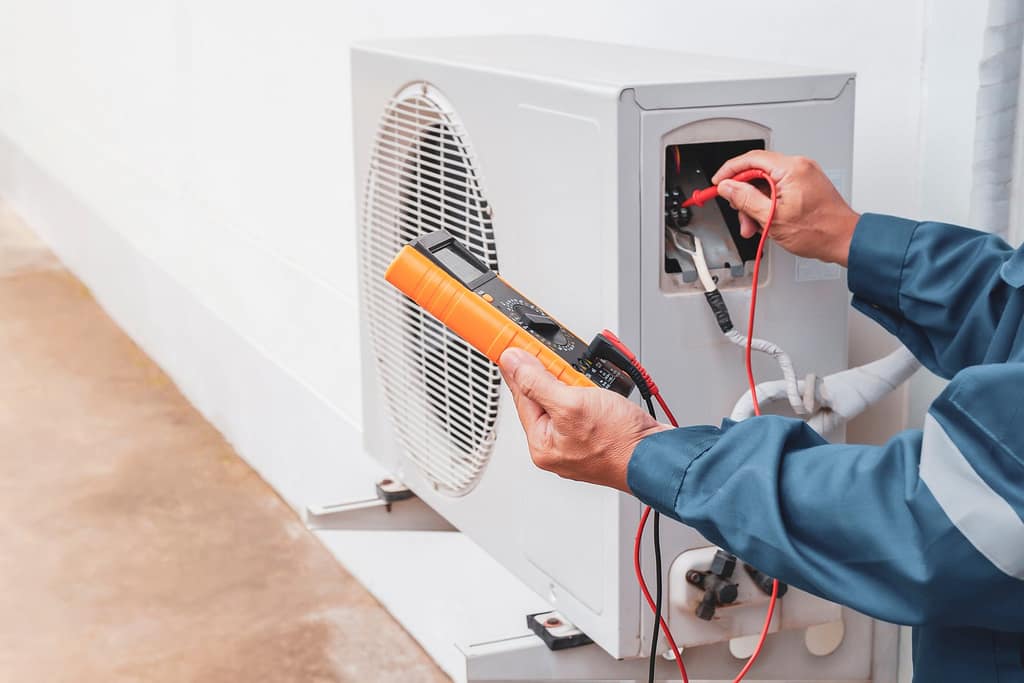As the climate continues to change and technology advances, air conditioning systems have become indispensable for maintaining indoor comfort. However, with these advancements come new challenges and potential issues that homeowners should be aware of. In this article, we’ll explore some common air conditioning problems that have emerged in 2023 and discuss how proactive maintenance can help prevent these issues, ensuring your AC system operates efficiently and reliably.
Refrigerant leaks have always been a concern, but they’ve become more critical in recent years due to environmental regulations. The phase-out of older refrigerants has led to the adoption of newer, environmentally-friendly options. However, these newer refrigerants can be less forgiving of leaks. Regular maintenance can include checking for leaks, repairing them promptly, and ensuring your system uses the right refrigerant.
Prevention: Schedule annual professional HVAC maintenance to inspect for leaks, and avoid DIY attempts to recharge refrigerant, as it may exacerbate the problem.
- Airflow Issues
With homes becoming more energy-efficient, there’s a greater emphasis on airtight construction. While this is good for energy savings, it can also impact the airflow within your HVAC system. Poor airflow can result in uneven cooling, reduced efficiency, and increased wear on the components.
As smart thermostats and integrated HVAC systems become more common, issues related to technology can arise. Connectivity problems, software glitches, and compatibility issues can disrupt your AC’s operation.
Prevention: Keep your smart system updated with the latest firmware and app versions. If you notice any connectivity or performance issues, consult your AC system’s user manual or contact the manufacturer’s customer support.
-
- Electrical Problems
Modern air conditioning systems rely heavily on electronic components. Electrical issues, such as faulty wiring, capacitor problems, or damaged circuit boards, can disrupt your system’s functioning and potentially cause safety hazards.
Prevention: Regularly inspect the wiring, keep the area around the outdoor unit clear of debris, and schedule professional maintenance to identify and address any electrical issues early.
-
- Sensor Inaccuracies

Advanced AC systems often feature sensors that detect room temperature and adjust cooling accordingly. If these sensors become dirty or malfunction, your AC might struggle to maintain the desired temperature.
Prevention: Keep sensors clean and unobstructed. If you notice temperature inconsistencies, consider recalibrating or replacing the sensor with professional assistance.
-
- Condensate Drain Clogs
Condensate drains remove excess moisture from your AC unit. Over time, these drains can become clogged with debris, leading to water leaks and potential water damage.
Prevention: Regularly clean and clear the condensate drain line. Consider installing a float switch that can shut off your AC if the drain becomes clogged to prevent water damage.
-
- Compressor Issues
The compressor is the heart of your AC system. Issues with the compressor can lead to decreased cooling performance, higher energy consumption, and costly repairs.
Prevention: Schedule regular professional maintenance to ensure your compressor is in good condition. Keep the outdoor unit clean and free of debris to maintain proper airflow.
-
- Evaporator Coil Freezing
Evaporator coils are responsible for cooling the air before it’s circulated throughout your home. If these coils become dirty or airflow is restricted, they can freeze up due to the accumulation of moisture and condensation.
Prevention: Keep air filters clean and change them regularly. Ensure proper airflow by not blocking vents or registers. If you notice ice buildup on the coils, turn off the AC and allow the ice to thaw before restarting.
-
- Noisy Operation
While modern AC units are designed for quieter operation, unusual noises can still occur, signaling underlying issues. Rattling, buzzing, or grinding sounds can indicate problems with fan blades, motors, or other components.
Prevention: Regularly inspect your AC unit for any signs of physical damage or loose parts. If you hear unusual noises, it’s best to contact a professional technician to diagnose and address the issue promptly.
-
- Short Cycling
Short cycling occurs when your AC unit turns on and off frequently, not allowing it to complete a full cooling cycle. This can lead to energy waste, increased wear on components, and reduced efficiency.
Prevention: Ensure your AC unit is sized correctly for your home’s cooling needs. Keep air filters clean and check for any obstructions around the indoor and outdoor units. If short cycling persists, it might be a sign of an underlying issue that requires professional attention.
-
- Lack of Maintenance
In the fast-paced world of 2023, it’s easy to overlook regular maintenance. However, neglecting maintenance can lead to a range of issues, from reduced efficiency to costly breakdowns.
Prevention: Establish a routine maintenance schedule, including professional inspections and DIY tasks like changing air filters. Regular maintenance not only prevents problems but also extends the lifespan of your AC system.
-
- Environmental Impact
With a growing focus on sustainability, it’s important to consider the environmental impact of your AC system’s refrigerants and energy consumption.
Prevention: Choose energy-efficient models when replacing your AC unit and ensure proper disposal of old units to prevent the release of harmful refrigerants. Consider using smart thermostats and programmable schedules to optimize energy usage.
Advancing AC Maintenance: A Comprehensive Approach

As we delve deeper into the complexities of modern air conditioning systems, it’s essential to adopt a comprehensive approach to maintenance that aligns with the challenges of 2023. Here’s how you can further enhance your AC maintenance routine:
-
- Data-Driven Insights
Utilize the power of data to your advantage. Smart thermostats and integrated systems can provide detailed usage data, energy consumption patterns, and even diagnostics. Regularly review this data to identify trends, anomalies, and potential areas for improvement.
-
- Proactive Professional Maintenance
While DIY maintenance is important, engaging professional HVAC services is crucial for a thorough inspection and maintenance. Professional technicians have the expertise to identify subtle issues that might not be apparent to homeowners.
-
- Smart System Integration
Leverage the full potential of your smart AC system. Set up alerts that notify you of unusual temperature fluctuations, low refrigerant levels, or other issues. This proactive approach allows you to address problems promptly and prevent more extensive damage.
-
- Seasonal Preparation
As we experience more extreme weather events due to climate change, it’s essential to prepare your AC system for varying conditions. Before the cooling season begins, schedule a professional tune-up to ensure your system is ready to handle the demands of the upcoming months.
-
- Regular Filter Upkeep

Changing air filters isn’t just about maintaining airflow; it’s also about indoor air quality. As indoor spaces become more sealed due to energy efficiency efforts, clean air filters play a crucial role in preventing allergens and pollutants from circulating in your home.
-
- Community and Online Resources
Engage with your local community and online forums to exchange experiences and insights. You might come across innovative maintenance strategies, troubleshooting tips, and recommendations for reliable HVAC service providers.
-
- Green Cooling Solutions
As sustainability becomes a more pressing concern, consider adopting eco-friendly cooling solutions. These may include integrating renewable energy sources, exploring energy-efficient insulation options, and incorporating smart systems that prioritize energy savings.
The landscape of air conditioning has evolved significantly in 2023, presenting homeowners with advanced technologies and new challenges. By embracing a comprehensive and proactive approach to maintenance, you can ensure that your AC system not only provides optimal comfort but also operates efficiently, sustainably, and reliably. As we navigate changing climate conditions and technological advancements, a well-maintained AC system remains an anchor of comfort and well-being within our homes.
In this era of constant innovation, technology has emerged as a powerful ally in AC maintenance. Embracing these advancements can elevate your maintenance efforts to new heights. Here’s how:
-
- Predictive Maintenance Systems
Harness the power of predictive maintenance systems that use sensors and data analytics to anticipate potential issues before they become major problems. These systems can detect anomalies in performance, such as irregular temperature fluctuations or unusual energy consumption patterns, and provide you with early warnings.
-
- Remote Diagnostics
Smart systems have brought remote diagnostics to the forefront of AC maintenance. Manufacturers and technicians can remotely access your system’s data to diagnose problems, reducing the need for physical visits. This not only saves time but also minimizes disruption.
-
- Augmented Reality Guides
Imagine using augmented reality (AR) to troubleshoot minor issues. Manufacturers are developing AR guides that use your smartphone or smart glasses to overlay instructions onto your AC unit, guiding you through simple maintenance tasks step by step.
-
- Energy Efficiency Analytics
Many smart AC systems offer real-time energy consumption data. By analyzing this data, you can identify energy-hungry patterns and make informed adjustments to your cooling habits, thereby optimizing energy efficiency.
-
- AI-Driven Insights
Artificial intelligence (AI) is making waves in the HVAC industry. AI algorithms can analyze a vast amount of data to provide tailored insights into your AC system’s performance. This includes suggesting optimal temperature settings, advising on maintenance schedules, and even predicting future breakdowns.
-
- Block chain for Transparency
Block chain technology is being explored for enhancing transparency and accountability in HVAC maintenance. With block chain, you can track the entire maintenance history of your AC system, ensuring that service records are accurate and tamper-proof.
-
- Collaborative Online Communities
Online platforms and forums dedicated to HVAC maintenance have flourished. Engaging in these communities allows you to exchange experiences, seek advice, and learn from others who have encountered similar issues. This collective knowledge can be invaluable for troubleshooting.
-
- Sustainability Integration
Consider integrating your AC maintenance with broader sustainability initiatives. Some manufacturers offer recycling programs for old units, allowing you to responsibly dispose of equipment. Additionally, explore options to offset your AC’s carbon footprint through environmental initiatives.
Final Thoughts
As we navigate the challenges and opportunities of AC maintenance in 2023, it’s clear that technology is the driving force behind modernizing and optimizing our approaches. Embracing predictive maintenance, remote diagnostics, AI-driven insights, and other technological advancements can revolutionize the way we care for our air conditioning systems. By staying informed and taking advantage of these tools, you can ensure that your AC system remains a reliable and efficient source of comfort while contributing to a more sustainable and energy-conscious future.
In 2023, air conditioning systems have reached new heights of efficiency and convenience, but they also come with their own set of challenges. By staying vigilant and proactive with regular maintenance, you can prevent or mitigate these common AC problems. Whether it’s addressing refrigerant leaks, ensuring proper airflow, or troubleshooting smart system malfunctions, a well-maintained AC system will provide the comfort and efficiency you need while minimizing the risk of unexpected breakdowns. Embracing these maintenance practices will ensure that your AC system remains a reliable and efficient cornerstone of indoor comfort in the years to come.





